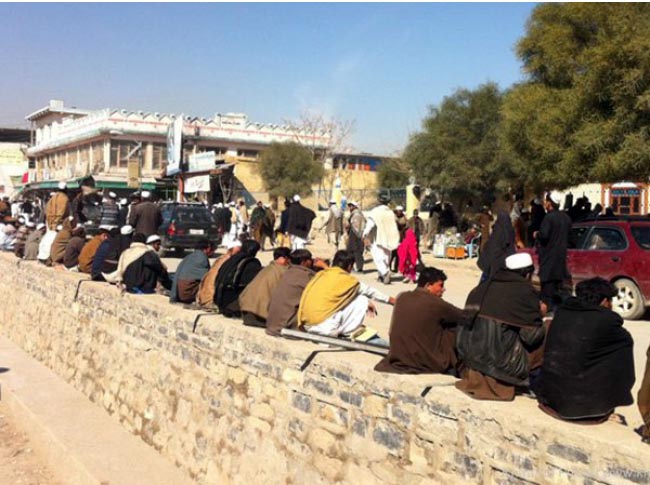KABUL - In a recent survey conducted by Democracy International (DI), in conjunction with Tadbeer Consulting, the study found that the youth in Afghanistan are generally more concerned about their economic status than politics.
When asked what the biggest problem Afghan youths facing today is, the majority of respondents (82 percent of household youths and 72 percent of students) said unemployment and poverty were the critical issues.
When asked if they had any intention of leaving the country to seek work abroad a staggering 46.7 percent of students said yes, while 36.8 percent of household youth said they too would leave.
However, on the need to vote in elections, 86 percent of household youth said this was very important while 94 percent of household youth said the need to be patriotic and loyal to the country was critical.
The percentage of household youth respondents who name unemployment as the biggest problem facing youth has more than doubled since 2013.
Students are however more interested and engaged in the political sphere than the general youth population but few young people are actually politically and civically active.
According to DI's 2015 Civic Education and Lessons Learned Survey, Afghan youth made up more than half of voters in the 2014 elections.
But in a statement issued by the organization on Sunday, it said: "As such a large constituency youth will likely have a significant impact on the future of Afghanistan's democracy and economy. Youth participation in elections and engagement in the democratic process as a whole are critical for the long-term consolidation of democracy in Afghanistan."
The statement went on to say: "Afghan youth also make up a substantial portion of the workforce. It is therefore vital that Afghan policymakers and international stakeholders understand the issues facing Afghan youth today."
In their survey, they found that in the household youth survey, just over four of 10 respondents are somewhat or very interested in national and local politics compared to about seven of 10 surveyed students.
"Students are more likely than the general youth population to participate in civic activities. Students are nearly twice as likely to run for an elected office as the general youth population and are more likely to vote than the general youth population," read their findings.
Only 22 percent of the students surveyed and seven percent of the general youth population participated in a demonstration in the last five years, the study found.
However, the survey found that young women face more barriers to political participation than young men.
In both groups of youth, women reported being invited to participate in political activities much less frequently than men and are less likely than men to attend political or civil society events.
Female respondents to the household youth survey are most likely to report cultural barriers as the primary obstacle to increased involvement in politics and security second.
A plurality of female household youth respondents (32 percent) who did not vote in the 2014 presidential and provincial council elections cites male family members preventing them from voting as the main reason.
However, it was found that there is a crisis of confidence in the government among Afghan youth.
"Significant numbers of general respondents reported having no confidence in the parliament (38 percent), the National Unity Government (39 percent), the President (43
"The vast majority of young people believe to some degree that politicians mostly work for the interest of their own ethnicity (90 percent), are only interested in people's votes (90 percent), and lose touch with young people quickly once elected (89 percent)," read the findings.
Meanwhile, on a more positive note the study found that youth are committed to the rule of law, but frustrated with corruption.
"Nearly all youth surveyed (98 percent) believe a model youth citizen must be law abiding, but 57 percent of youth believe it is impossible to live in Afghanistan without committing corruption or paying a bribe."
The study found that youth overwhelmingly believe there should be strict punishment for corruption, although a strong majority (65 percent) believes there is nothing the government can do when leaders break the law.
"Young Afghans believe parliament can play an important role in combatting corruption, with 72 percent believing it can hold government accountable."
DI has worked to support the strengthening of Afghanistan's electoral processes, both through international election observation missions as well as by supporting domestic advocacy for electoral reform. Currently, DI implements USAID's Afghanistan Electoral Reform and Civic Advocacy program (AERCA) – which aims to support Afghan-led advocacy efforts for electoral and democratic reform and to conduct research that can inform and encourage the debate on reform.
In line with this, DI interviewed thousands of young Afghans to take the pulse of this crucial segment of Afghanistan's population on critical issues like politics, the economy, and security. Their report details the survey findings and highlights trends in the opinions of Afghan youth – both university students and the general youth population.
The 66-question survey instrument was administered to 4,020 randomly selected Afghans between the ages of 18 and 35 in all 34 provinces and, in order to allow comparison of the opinions of the more educated and the less educated Afghan youths, 1,000 students from 15 public and 16 private universities in 12 provinces were consulted. (Tolonews)

